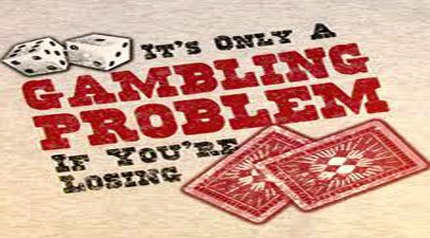Do You Have a Gambling Addiction
For many, gambling is a pastime or hobby, with the added bonus of offering the chance to win money, although for some, it can easily become a gambling addiction, and lead to various other problems. Around 2.5 million Americans have a gambling problem, although it is often understandably difficult to get more exact figures. Men comprise about 75 percent of those who have a problem with gambling, and in many cases the addiction develops early in life. Those with a personality disorder, alcohol or drug problem are more likely to have a gambling problem, as are those affected by a stresser, such as divorce or unemployment. The Internet has made it much easier for just about anyone to gamble; you don’t necessarily need to live in Las Vegas or Atlantic City to have a serious problem.
What Is A Gambling Addiction?
Gambling, by its very nature can be exciting and involves an element of risk; many gamblers experience an adrenaline rush that few other activities can provide. Partly because of this, it can be difficult to realize when you – or someone else – has a problem. An addicted, or compulsive gambler tends to gamble regardless of the mood that they are in, and they generally want to gamble regardless of the consequences. In short, if you are gambling to the point where it affects your life, you probably have a problem, which in medical language is known as an impulse control disorder.
Signs Of Gambling Addiction
Because many people are so reluctant to admit that they have a problem, it is often family or friends who notice it and insist on the person getting help. Some common signs include spending too much time gambling and not acknowledging that, becoming irritable when talking about the subject, and jeopardizing personal relationships or a job. If you sell items or borrow money in order to gamble, it’s a sure sign of having a problem, and many compulsive gamblers literally spend every penny they have on their gambling addiction and end up with hundreds of dollars of debt. If you gamble because you are depressed, sad or lonely it can also be a sign of addiction, and repeatedly trying to stop gambling and failing to do so, is also a red flag.
Help For Gambling Addiction
The first step in treating any gambling addiction is to accurately diagnose the problem, and determine whether there are other medical or psychological issues involved. Although many addicted gamblers know they have a problem and are able to stop, admitting the problem is sometimes the hardest part of the treatment process for many. For some, avoiding tempting situations, and making sure they do not have the money or opportunity to gamble, can be sufficient to break the habit. Other problem gamblers may need some type of therapy or treatment, which is typically tailored towards that individual. Treatment may include medication for any underlying condition, counseling, education on the dangers of the addiction, and the help of a support group. If you or someone you know does have a gambling addiction, there is help available.







 Medical DetoxTreatment Center Finder has placed countless people into a medical detox for drugs and alcohol. We know what you are going through and will work to find the best detox for your individual needs. Learn More...
Medical DetoxTreatment Center Finder has placed countless people into a medical detox for drugs and alcohol. We know what you are going through and will work to find the best detox for your individual needs. Learn More... Inpatient TreatmentGetting into an inpatient treatment center is the best thing someone can do when facing an addiction to drugs and alcohol. Learn more about our network of residential facilities. Get Help Today...
Inpatient TreatmentGetting into an inpatient treatment center is the best thing someone can do when facing an addiction to drugs and alcohol. Learn more about our network of residential facilities. Get Help Today... Rehab In Your StateWe are here to help you find a rehab whether you are looking in or out of your state. Get away from addiction through one of our rehab centers - the top treatment centers in the nation. Find a Rehab...
Rehab In Your StateWe are here to help you find a rehab whether you are looking in or out of your state. Get away from addiction through one of our rehab centers - the top treatment centers in the nation. Find a Rehab...

Writing articles is time consuming.I know where you can get unlimited content for your site, search in google:
Anightund’s rewriter